'I do press ups every day so I can care for my son'
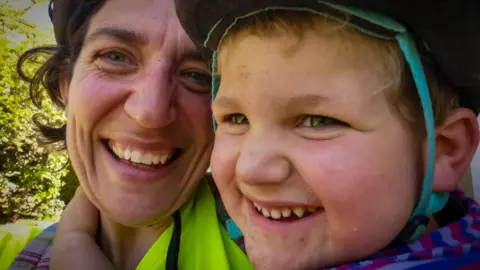 Family photo
Family photoThe mum of a disabled five-year-old does press ups every morning in order to be able to care for him but is scared of what will happen when he gets too big to manage alone.
Ivor has Angelman syndrome, a rare genetic condition that affects the nervous system and causes severe physical and learning disabilities.
His mum Sarah, from Monmouth, is among 310,000 unpaid carers in Wales and a recent report found "serious gaps" in how care is valued, supported and delivered across the country.
The Welsh government said it was vital for parents to get the support they needed.
Ivor's condition affects about one in every 15,000 people and means he needs constant supervision, struggles to sleep through the night, cannot speak, understand the word "no" and is not toilet trained.
Sarah, 44, said he was a happy, growing boy who loves to cuddle, walk and play, but she needed to stay fit to keep her strength up as he gets bigger.
She said: "I actually already feel I'm almost at max, which is pretty damn frightening given I'm only two years into this whole new world."
Some with Angelman syndrome end up needing two strong carers with them all the time, which seems "extravagant" she said, until you see what it takes to keep them safe.
She said: "I'm just taking it a month at a time, but there is going to come a point where we're going to have to ask for extra help in that respect."
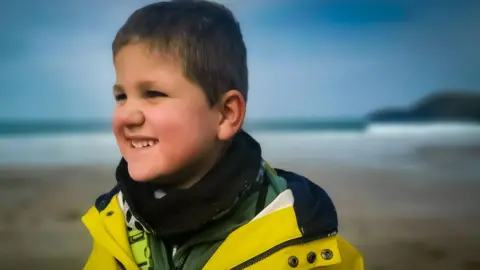 Family photo
Family photo"The longer I can do that, the more Ivor can develop, the more I can guide and help him to actually learn to use a step, to get in and out of the bath.
"So Ivor and I are kind of like blossoming together and trying to find our own way because we just have to," she said.
Sarah said continuing to work as a solicitor had given her a sense of balance and stopped her from becoming "saturated" by her son's disability and what may lie ahead.
"Everything had been pretty run of the mill, pretty normal, very joyful and then you think, 'oh, my goodness, this is a parallel world like I had no idea existed'."
She was suddenly "carer" and had to deal with a myriad of hard-to-navigate forms for medical and social care.
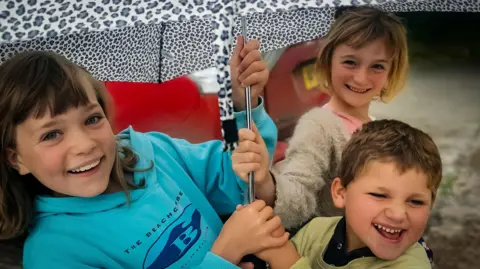 Family photo
Family photo"It's like a bomb hit, and I'm fairly on it," she laughed.
"The amount of stuff you've got to do... medical appointments, or just extra stuff like forms to fill in, grant applications, blue badge applications."
She described disability living allowance forms as a "complete headache", particularly on top of caring responsibilities and looking after the rest of the family.
Sarah said she had a "deep sadness" for her daughters, Bethan, 11, and Olwen, seven, and was worried they get less time with their parents.
"Ivor pinches, he bites and pulls and messes things up... he's not a normal brother," she said, adding her daughters are also his carers and give her "emotional support".
Ivor is now in primary school with his sisters which Sarah said has "helped tremendously" in managing her work and administration of her son's care.
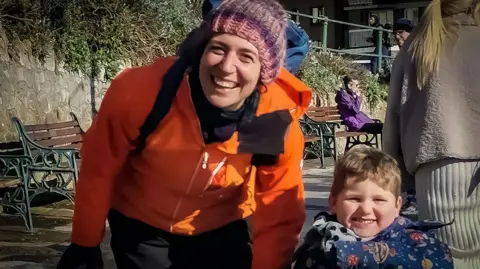 Family photo
Family photoSarah has scaled back her career as a solicitor to part-time, saying caring for Ivor was a full-time job.
"He will always need me, and in weird way that that fills me with joy at the same time as worry, because I will always have a real purpose in my life."
She said the one thing she would change would be the "black horror" of a three-year wait for Ivor's diagnosis, and as a campaigner for Foundation for Angelman Syndrome Therapeutics (Fast) has called for a heel prick test for genetic conditions in all babies.
She has been joined in these calls by former prime minister Lord Cameron, and said an earlier diagnosis would have given Ivor access to "crucial" therapies.
How to help carers?
Sarah said Ivor's use of touch and eye contact as communication could be intimidating for some.
But once you get to know him, as many people do in Monmouth where she and Ivor often walk around town, they find an "innocent nugget of joy", who has had a profound effect on them.
The Carers Trust said three in five people would be a carer at some point in their lifetime.
A survey of 2,300 UK families raising disabled or seriously ill children by the charity Family Fund found 44% struggled to meet day-to-day living costs, despite receiving disability benefits.
Responses from more than a quarter suggested signs of clinical depression.
Family Fund gave financial help to Hannah Leonard, 41, a social care worker looking after her severely disabled daughter Darcy, six, in Rhyl, Denbighshire.
Hannah has achondroplasia, a bone growth disorder that causes dwarfism.
Darcy is autistic, with epilepsy and dysphasia, which makes it difficult for her to talk, and she also has no sense of danger.
She is already nearly as tall as her mum.
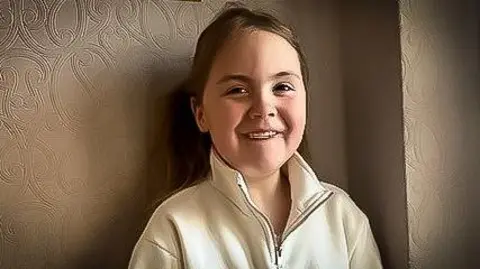 Family photo
Family photo"There have been incidents where she has slipped my hand, and she has ran towards a main busy road, and I literally thought, 'I'm gonna lose her here'," she said.
"Luckily, the grace of God or whatever it was, she turned.
"There's no rest time, our doors have to be locked because she's looking for food or she's trying to climb," Hannah said.
"You're always on high alert.
"Parents of children with autism or neurodiverse children have stress levels proven to be that of a combat soldier."
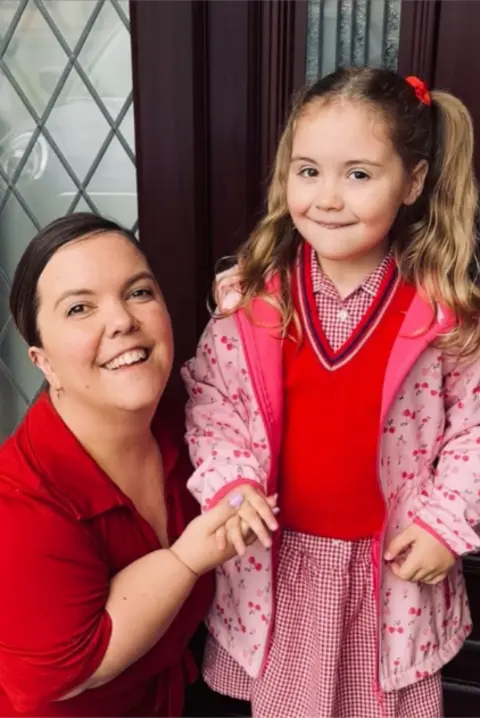 Family Fund
Family FundHannah said her pension-age mum still help with the "things I can't do" and they got "very little help" from the NHS or local authority.
She said she had been waiting a year for a social worker and was paying £300 per month for private speech and language therapy, alongside 60-mile (97km) round trips to Liverpool for trampoline physiotherapy to help with her balance.
"I think we will need assistance somewhere later on down the line," she said, adding Family Fund paid for a tablet device that helps Darcy to communicate.
"Unpaid carers keep this country up," she said.
A report published last week, the first of its kind in the UK, found serious gaps in how care was valued, supported and delivered across Wales.
Oxfam Cymru, the Bevan Foundation and Carers Wales published a review of how well Welsh government policies supported carers and care workers - both in adult care and childcare.
It said the care system was stretched to breaking point and that Wales falls short on the implementation of almost every aspect of care policy, with patchy progress, disjointed systems and too many people slipping through the cracks.
Care keeps Wales running, it said, but many of those providing the care were struggling financially, had poor health and wellbeing and had to cut back on food and heating.
The Welsh government said it was "vital" parents received the support they needed alongside health and social care systems.
It said: "We've provided £5.25m this year to maintain our short breaks scheme which has enabled more than 30,000 unpaid carers to have a break from their caring role to pursue a hobby or enjoy a social activity, and the carers support fund which provides carers with emergency financial assistance."
Additional reporting by India Pollock, BBC Wales social affairs correspondent
